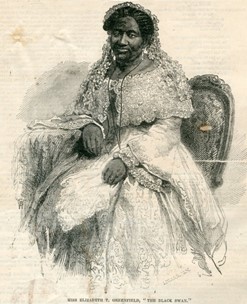
Vocal Music from a Nightingale: Elizabeth Taylor Greenfield
The first African American classical singer of the nineteenth century who established the bar for all singers to follow could arguably be Elizabeth Taylor Greenfield (c. 1819-1876), also dubbed the "Black Swan" because of her "full, round sound … and immense compass and depth" (Trotter 2009 [1878], 71). "Born a slave in Natchez, Mississippi, she was taken to Philadelphia as an infant, where she was adopted by a Quaker, Mrs. Greenfield. Elizabeth's guardian arranged for her to study music as a child, despite the Society of Friends' ban on musical pursuits and allowed her to sing at private parties. Greenfield made her debut in 1851, singing before the Buffalo Musical Association and thereby establishing her reputation as an artist" (Wright 2015, 103). Traveling and performing extensively in the United States and Europe, Greenfield laid the groundwork that made it easier for the African American sopranos that came after her. No recordings of Greenfield exist. Other notable sopranos of this period would include Nellie Brown Mitchell (1845-1924), Marie Selika Williams (c. 1849-1937), and Matilda Sissieretta Jones(c. 1868-1933) known as the "Black Patti."

Elizabeth Taylor Greenfield (c. 1819-1876)
Another important source for information on this topic is Sonja Wilson's dissertation on concert singers of the nineteenth century, which has a chapter titled "Not All Nightingales Are White" (Gable Wilson 2005, 28).





